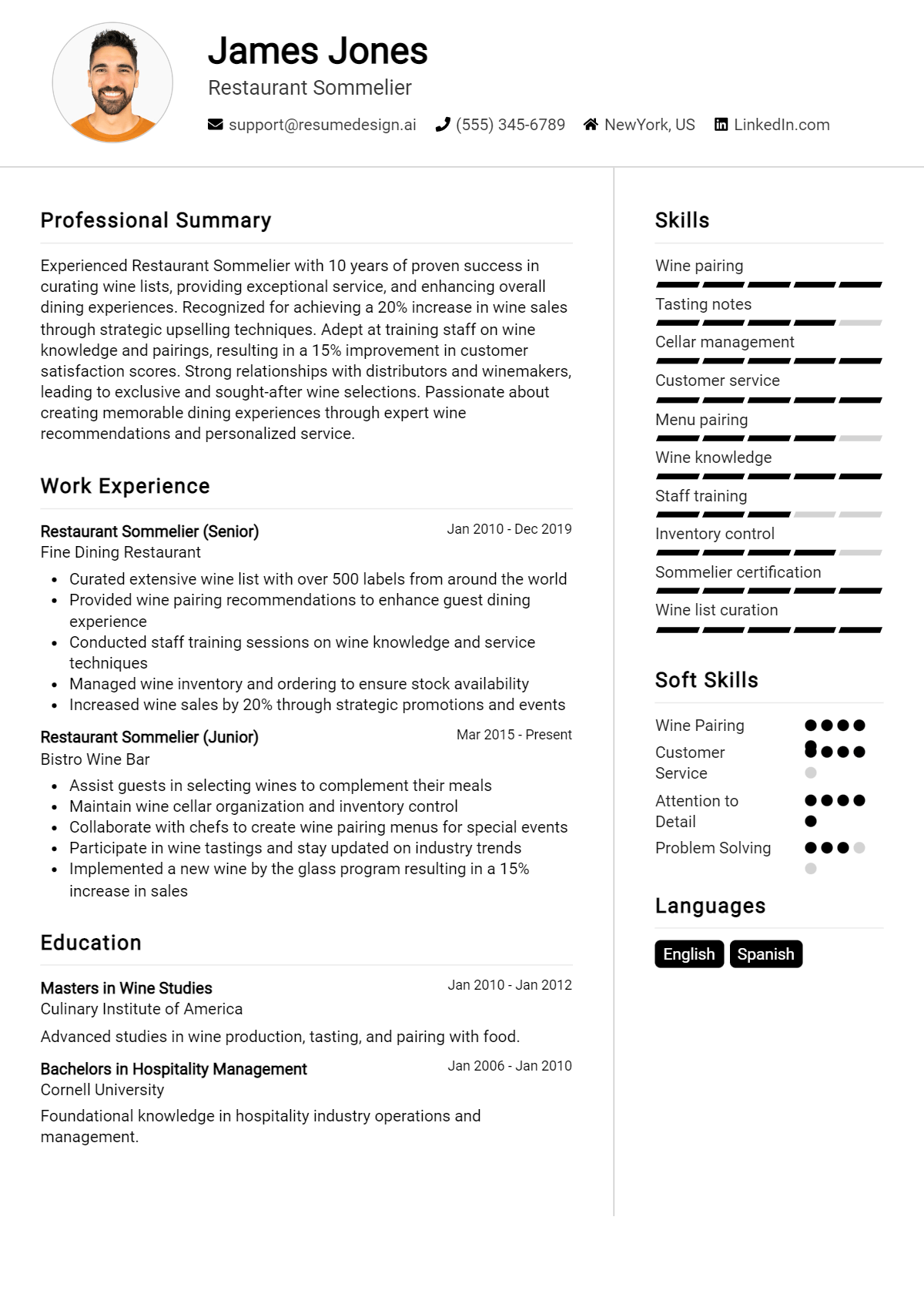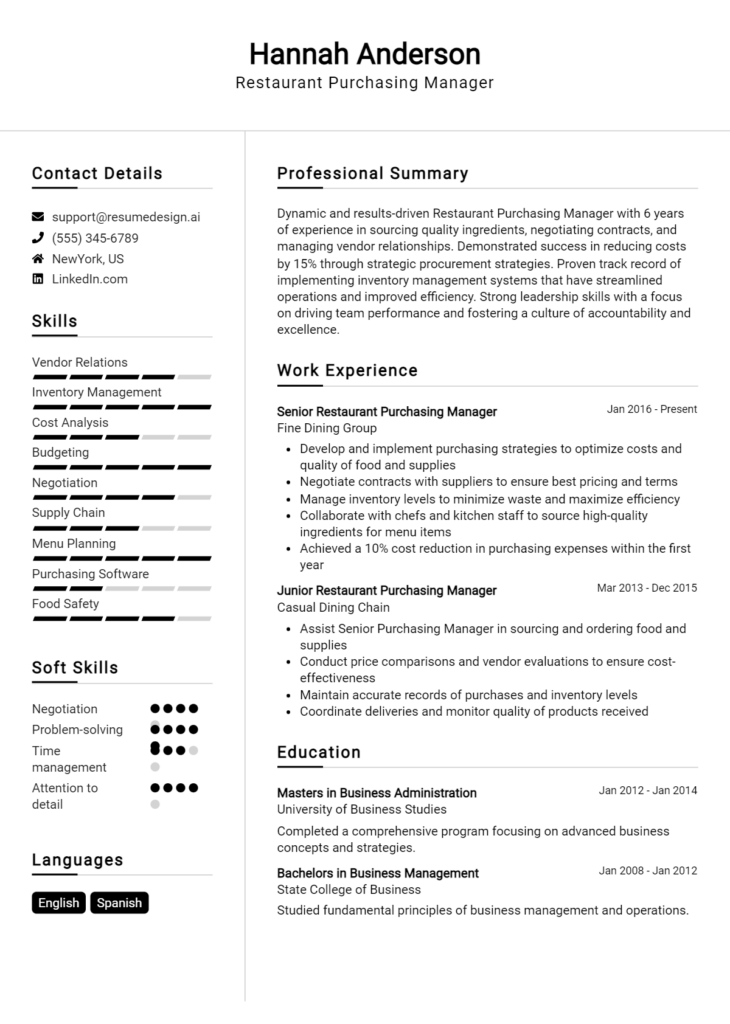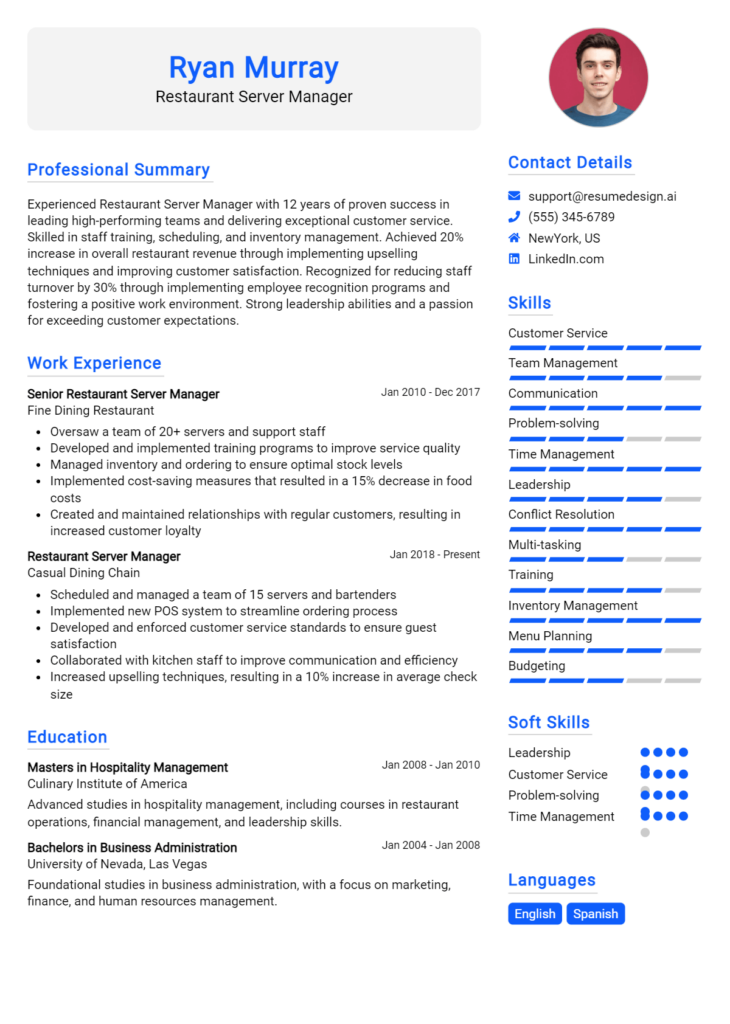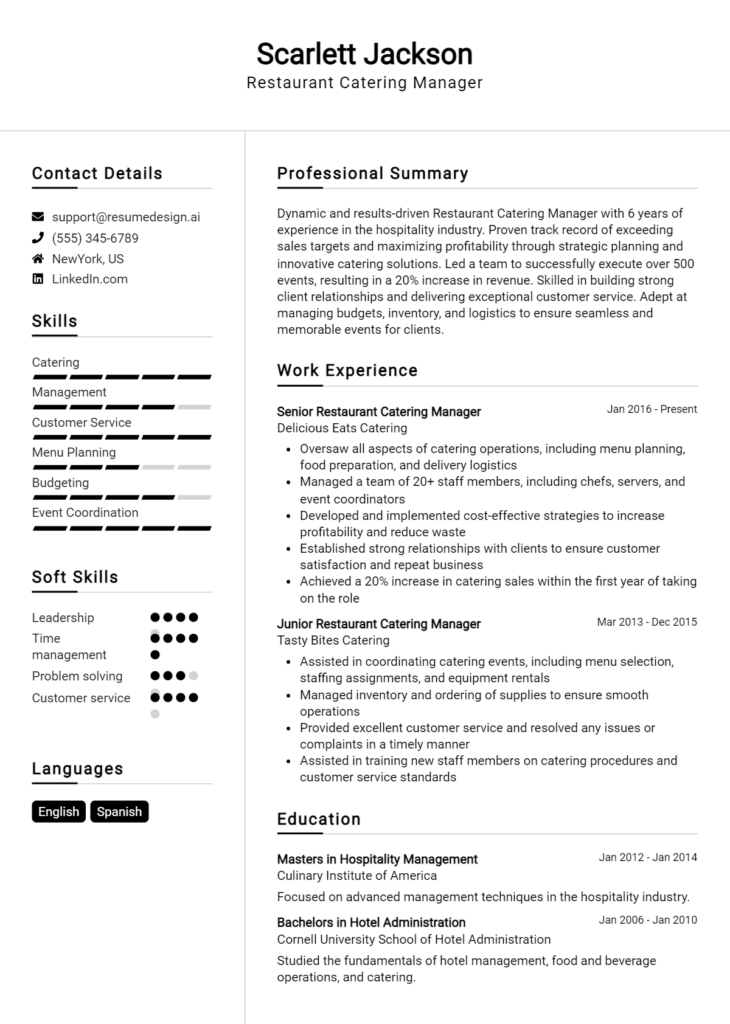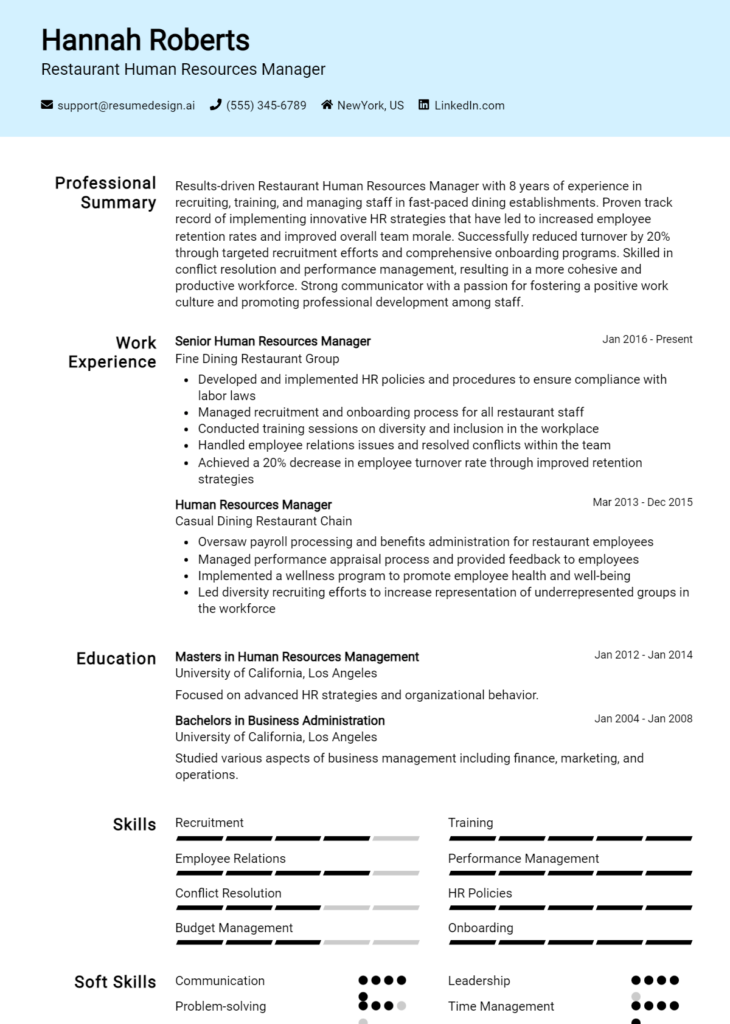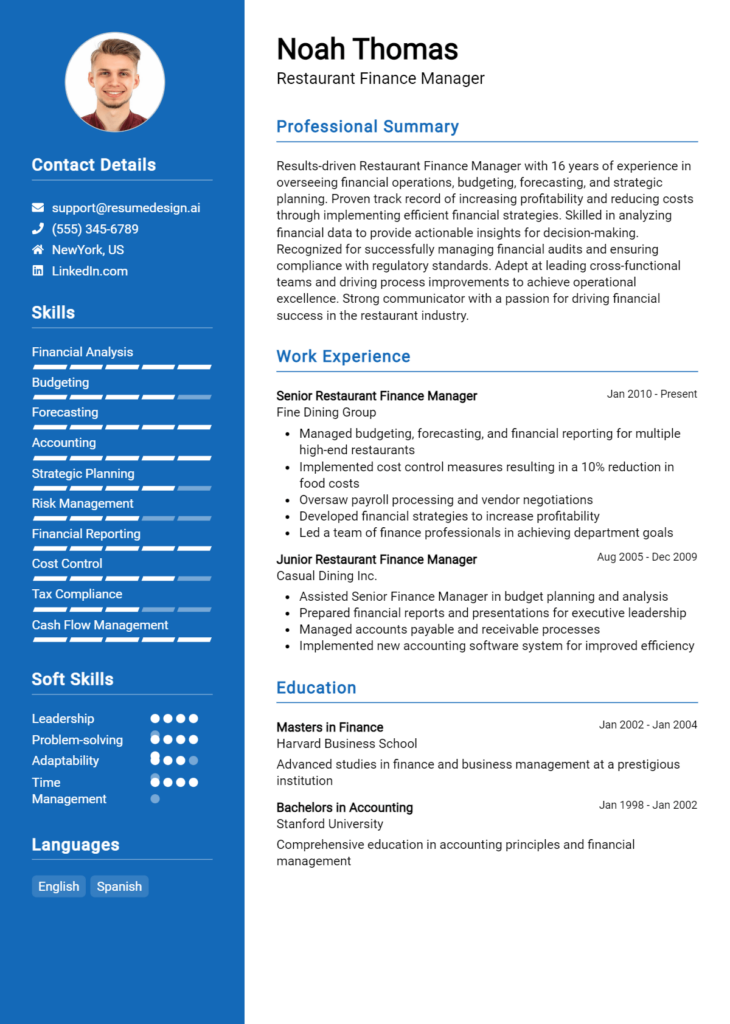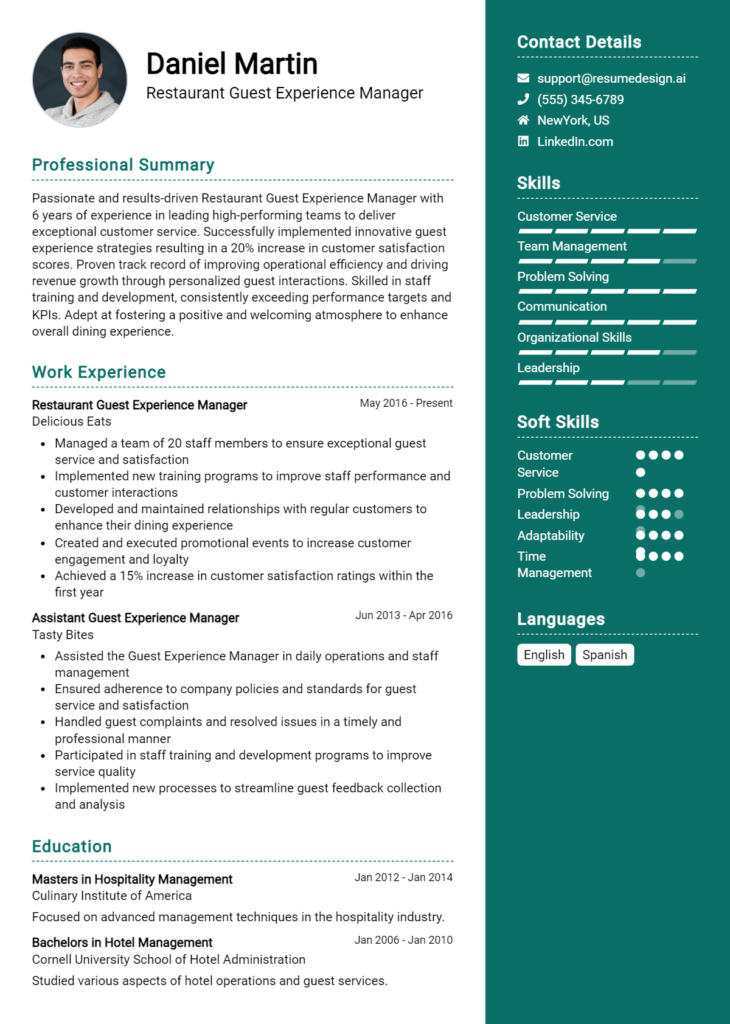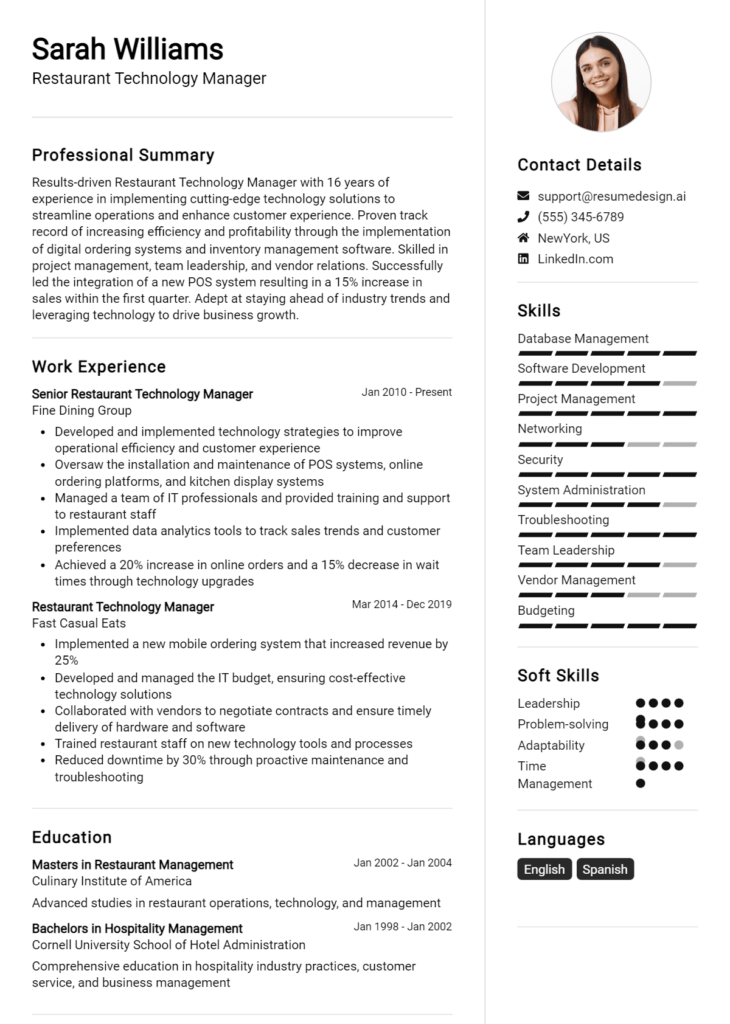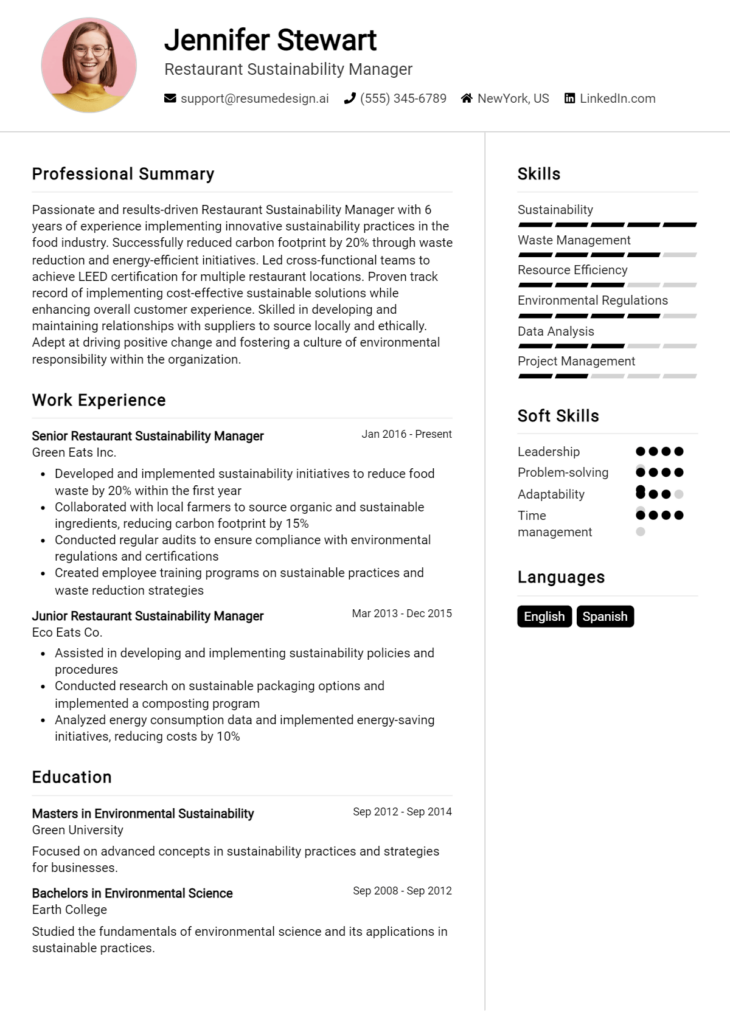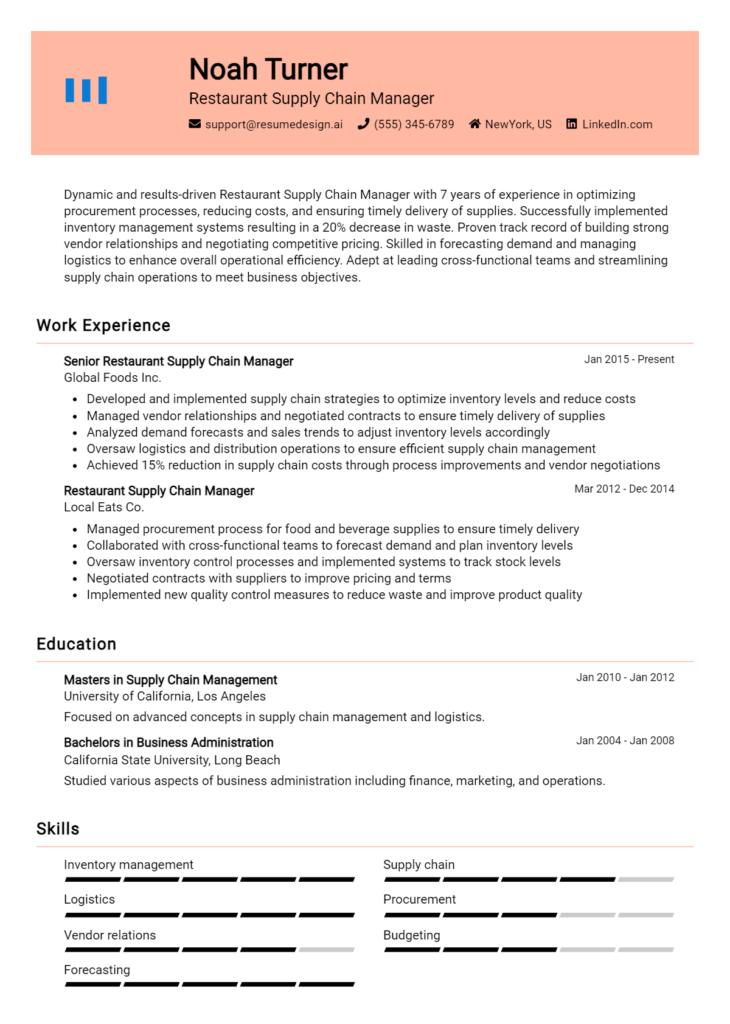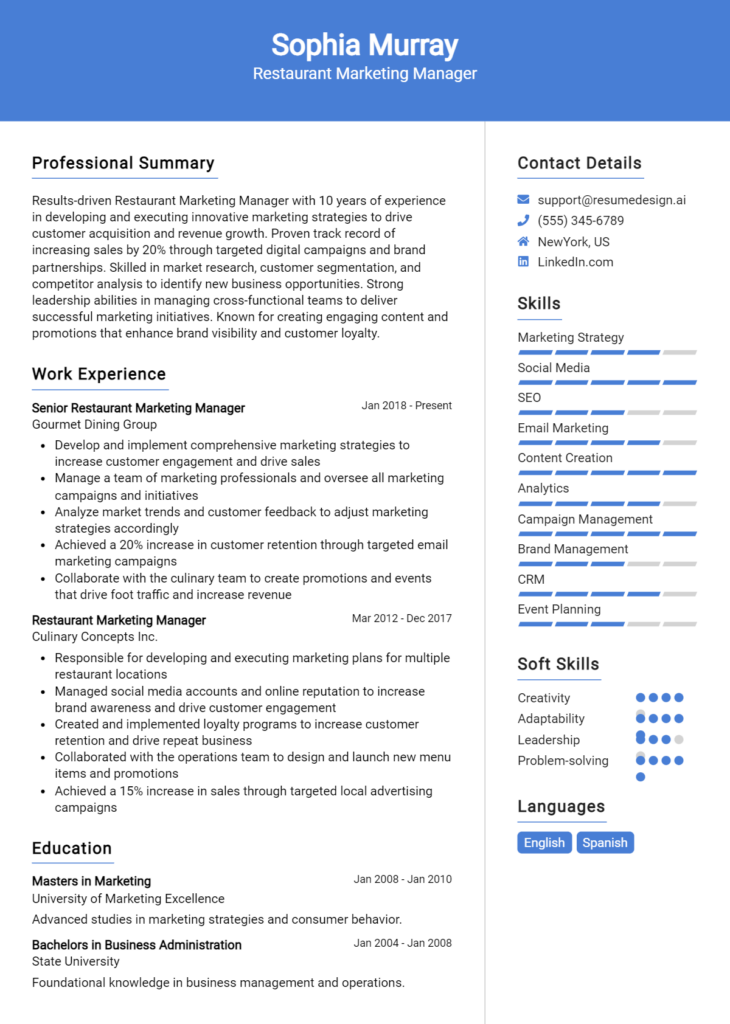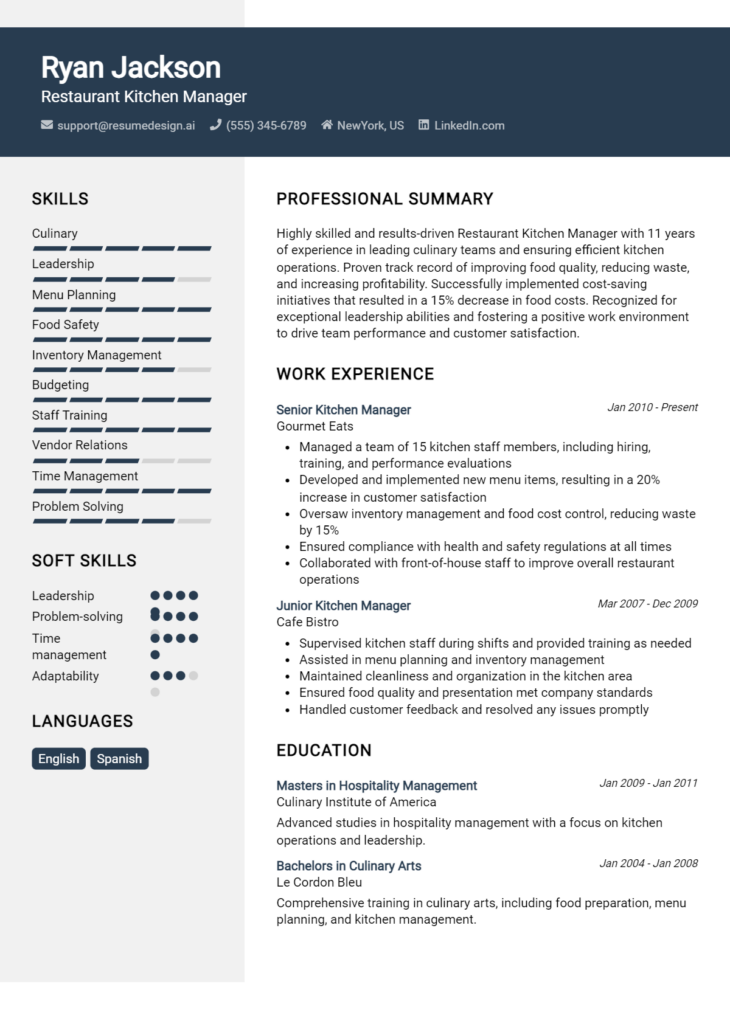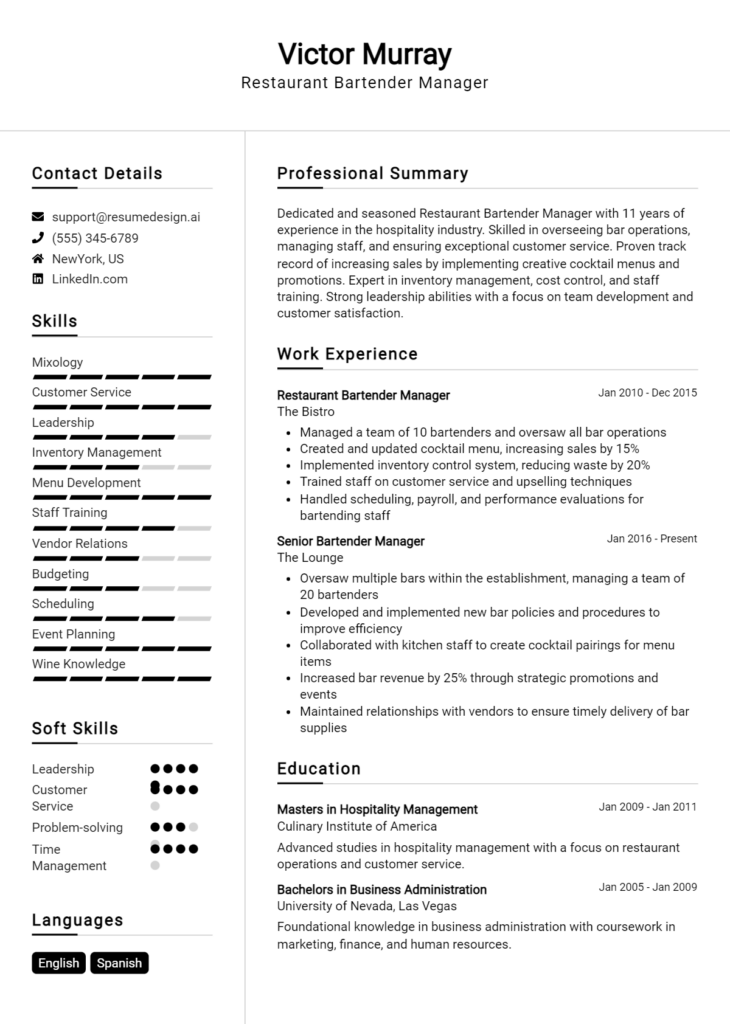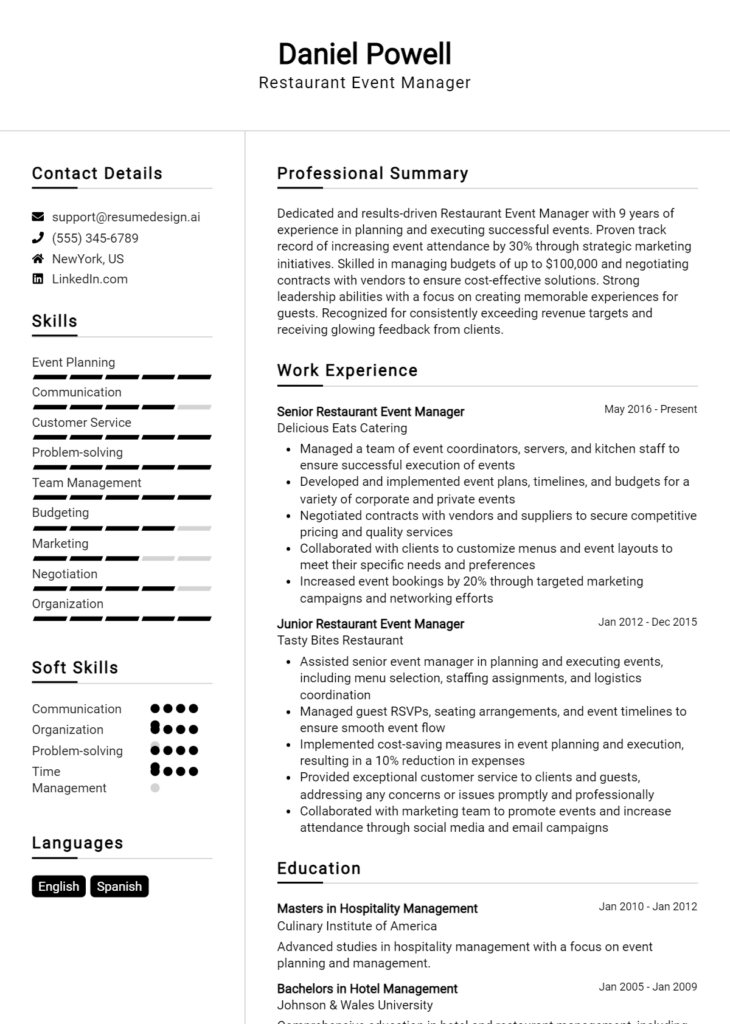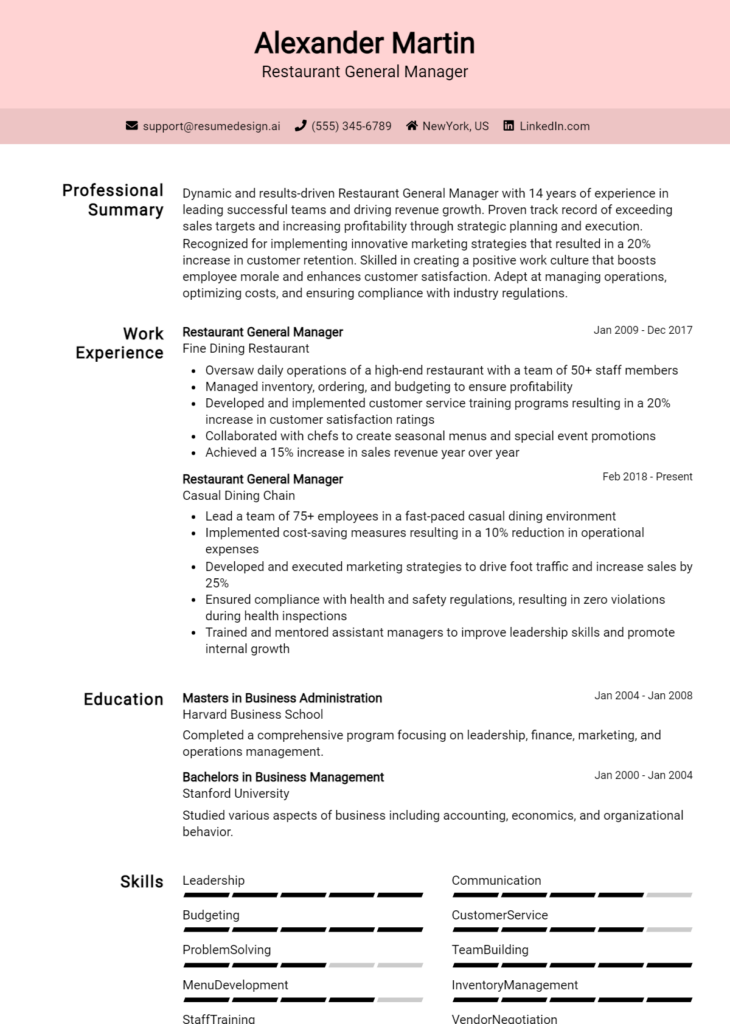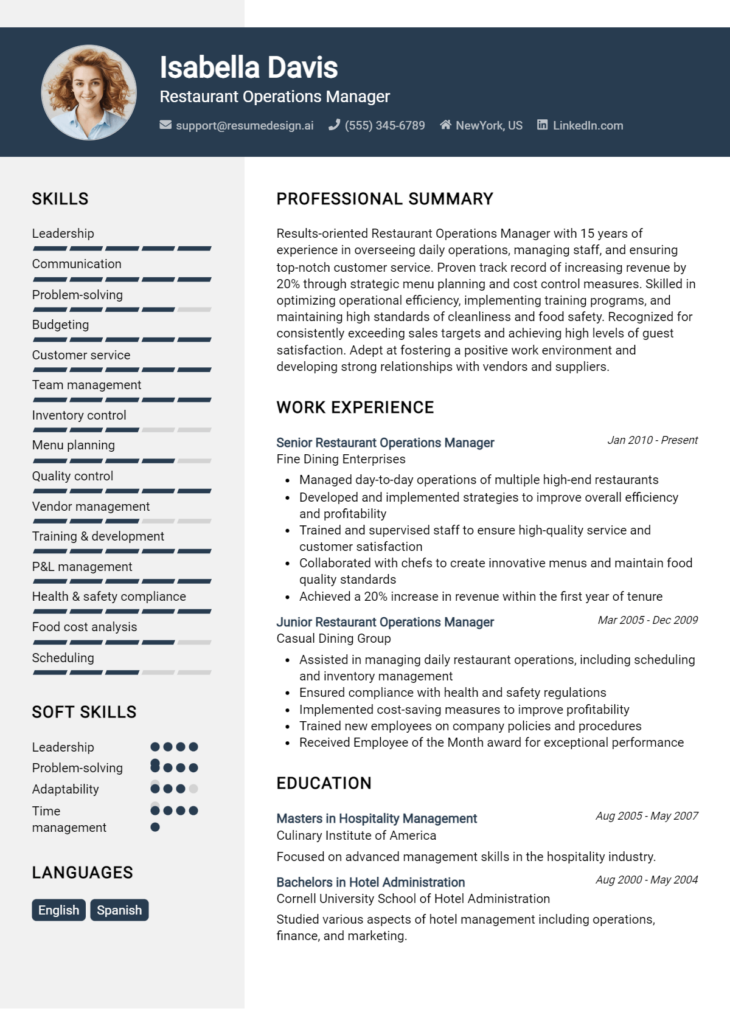Restaurant Sommelier Core Responsibilities
A Restaurant Sommelier plays a crucial role in enhancing the dining experience by expertly selecting wines that complement the menu offerings. This position requires strong technical knowledge of wines, exceptional customer service skills, and the ability to collaborate with kitchen staff and management. Problem-solving abilities are essential for addressing guest inquiries and pairing challenges. A well-structured resume highlighting these competencies can effectively showcase how the sommelier contributes to the restaurant’s goals, ensuring a memorable culinary experience.
Common Responsibilities Listed on Restaurant Sommelier Resume
- Curate and maintain an extensive wine list aligned with the restaurant's offerings.
- Conduct wine tastings and training sessions for staff to enhance their wine knowledge.
- Assist guests in selecting wines that pair well with their meal choices.
- Monitor wine inventory and manage ordering to ensure optimal stock levels.
- Stay updated on wine trends and industry developments.
- Develop relationships with wine distributors and producers.
- Conduct regular quality checks on wine storage conditions.
- Provide input on wine-related promotions and events.
- Collaborate with chefs to create harmonious food and wine pairings.
- Resolve customer complaints and ensure satisfaction with wine selections.
- Prepare detailed reports on wine sales and customer preferences.
High-Level Resume Tips for Restaurant Sommelier Professionals
In today's competitive culinary landscape, a well-crafted resume is essential for Restaurant Sommelier professionals looking to make a memorable first impression. Your resume often serves as the initial point of contact with potential employers, and it needs to effectively reflect your unique skills, accomplishments, and passion for wine and gastronomy. A standout resume not only highlights your qualifications but also tells the story of your career journey, demonstrating your expertise in wine selection, food pairing, and guest experience enhancement. This guide will provide practical and actionable resume tips specifically tailored for Restaurant Sommelier professionals, helping you to present your qualifications in the best light possible.
Top Resume Tips for Restaurant Sommelier Professionals
- Tailor your resume for each job application by aligning your skills and experiences with the specific requirements outlined in the job description.
- Highlight relevant experience in the wine industry, including positions held, types of establishments worked for, and any specialized training or certifications.
- Quantify your achievements by including metrics such as sales increases, customer satisfaction scores, or successful wine pairings that enhanced the dining experience.
- Showcase your industry-specific skills, such as knowledge of wine regions, varietals, and food pairing techniques, to demonstrate your expertise.
- Incorporate keywords from the job posting to ensure your resume passes through Applicant Tracking Systems (ATS) and reaches hiring managers.
- Use a professional format with clear headings and bullet points to enhance readability and make your resume visually appealing.
- Include any awards or recognitions you've received in the field, such as certifications from recognized wine education programs.
- Demonstrate your passion for wine and hospitality through a brief personal statement or summary at the top of your resume.
- List language skills, especially if you are fluent in languages relevant to the clientele of the restaurant, as this can set you apart in the service industry.
- Keep your resume concise, ideally one page, focusing on the most relevant experiences and achievements that will captivate potential employers.
By implementing these tips, Restaurant Sommelier professionals can significantly enhance their resumes, making them more appealing to hiring managers. A well-structured and tailored resume that effectively showcases your skills and achievements will increase your chances of landing a coveted position in the dynamic and rewarding field of wine and hospitality.
Why Resume Headlines & Titles are Important for Restaurant Sommelier
The role of a Restaurant Sommelier is integral to enhancing the dining experience, and a well-crafted resume is essential for showcasing one’s expertise in wine selection and pairings. The importance of resume headlines and titles cannot be overstated; they serve as the first impression for hiring managers, encapsulating a candidate's key qualifications in a concise and impactful phrase. A strong headline or title can immediately grab attention, making it easier for employers to identify the right fit for their establishment. Therefore, it's crucial that these headlines are concise, relevant, and directly related to the sommelier position being applied for, setting the tone for the rest of the resume.
Best Practices for Crafting Resume Headlines for Restaurant Sommelier
- Keep it concise: Aim for one to two impactful phrases.
- Be specific: Use keywords related to the sommelier role.
- Highlight key strengths: Emphasize skills and experiences pertinent to wine and food pairing.
- Showcase certifications: Mention any relevant certifications, such as WSET or CMS credentials.
- Use action-oriented language: Start with dynamic verbs to convey proactivity.
- Tailor for the job: Customize the headline based on the specific job description.
- Avoid jargon: Use clear language that is easily understood by hiring managers.
- Incorporate metrics: If applicable, include quantifiable achievements to demonstrate impact.
Example Resume Headlines for Restaurant Sommelier
Strong Resume Headlines
Award-Winning Sommelier with 10+ Years of Experience in Fine Dining
Certified Wine Expert Specializing in Regional Pairings and Guest Education
Dynamic Sommelier Committed to Elevating Culinary Experiences Through Wine
Experienced Sommelier Known for Curating Exceptional Wine Lists and Pairings
Weak Resume Headlines
Wine Lover Looking for a Job
Experienced Professional in the Food Industry
Sommelier Seeking New Opportunities
The strong headlines are effective because they are specific, highlight relevant experience, and convey a sense of professionalism and expertise that is essential in the role of a sommelier. They allow the candidate's unique qualifications to shine through, making a compelling case for their candidacy. In contrast, the weak headlines fail to impress due to their vagueness and lack of specificity, leaving hiring managers uncertain about the candidate’s qualifications and suitability for the role. A well-crafted headline can make all the difference in capturing attention and inviting further exploration of a candidate's resume.
Writing an Exceptional Restaurant Sommelier Resume Summary
A well-crafted resume summary is crucial for a Restaurant Sommelier as it serves as the first impression to potential employers. This brief section provides an opportunity to highlight your key skills, relevant experiences, and notable accomplishments in the field of wine and food pairing, immediately capturing the attention of hiring managers. A strong summary should be concise and impactful, tailored specifically to the job you are applying for, ensuring that it reflects the unique qualifications that make you an ideal candidate for the role.
Best Practices for Writing a Restaurant Sommelier Resume Summary
- Quantify Achievements: Use specific numbers to highlight your successes, such as increasing wine sales by a certain percentage.
- Focus on Skills: Emphasize key skills such as wine knowledge, customer service, and food pairing expertise.
- Tailor to Job Description: Customize your summary to reflect the requirements and preferences outlined in the job listing.
- Showcase Relevant Experience: Highlight previous roles and responsibilities that directly relate to the sommelier position.
- Use Industry Terminology: Employ specific wine terminology and industry jargon to demonstrate your expertise.
- Keep it Concise: Aim for 2-4 sentences that deliver a powerful message without overwhelming the reader.
- Highlight Certifications: Mention any relevant certifications such as WSET or CMS that validate your expertise.
- Reflect Passion for Wine: Convey your enthusiasm for wine and gastronomy, which is essential for a successful sommelier.
Example Restaurant Sommelier Resume Summaries
Strong Resume Summaries
Dynamic and detail-oriented Sommelier with over 8 years of experience in fine dining establishments, recognized for increasing wine sales by 30% through innovative pairing suggestions and exceptional customer service.
Certified Level 3 WSET Sommelier with a proven track record of enhancing guest experiences by curating bespoke wine lists and conducting engaging tasting events, resulting in a 25% increase in repeat customers.
Passionate Sommelier with expertise in French and Italian wines, successfully managed a $500,000 wine inventory while reducing costs by 15% through strategic supplier negotiations and inventory optimization.
Weak Resume Summaries
Experienced sommelier who knows a lot about wine.
Dedicated professional seeking a position in a restaurant where I can use my skills.
The strong resume summaries effectively highlight specific achievements, relevant skills, and a direct correlation to the sommelier role, showcasing the candidate's value to potential employers. In contrast, the weak summaries lack detail and quantifiable outcomes, making them too generic to stand out in a competitive job market.
Work Experience Section for Restaurant Sommelier Resume
The work experience section of a Restaurant Sommelier Resume serves as a crucial platform for candidates to demonstrate their technical expertise, team management capabilities, and ability to deliver exceptional products in a dynamic culinary environment. This section allows potential employers to assess the sommelier's qualifications and experience in selecting, pairing, and presenting wines, while also showcasing their contributions to enhancing the dining experience. By quantifying achievements and aligning their experiences with industry standards, candidates can effectively illustrate their impact and value to prospective employers.
Best Practices for Restaurant Sommelier Work Experience
- Focus on specific technical skills such as wine knowledge, tasting techniques, and cellar management.
- Quantify achievements with metrics like sales increases, customer satisfaction ratings, or wine pairings that resulted in higher check averages.
- Highlight collaborative efforts with chefs and staff to create cohesive dining experiences.
- Detail experiences with wine programs, including development and execution of training sessions for staff.
- Emphasize certifications and ongoing education in wine and sommelier training.
- Showcase participation in wine tastings, events, or competitions that demonstrate expertise and recognition.
- Include any roles in managing inventory and supplier relationships to reflect operational knowledge.
- Demonstrate adaptability in responding to customer preferences and industry trends.
Example Work Experiences for Restaurant Sommelier
Strong Experiences
- Increased wine sales by 30% over one year by implementing a new pairing menu and conducting staff training sessions on wine selection.
- Collaborated with the executive chef to design a seasonal wine list, resulting in a 25% increase in customer satisfaction scores related to dining experience.
- Managed a wine cellar inventory of over 500 labels, optimizing stock levels and reducing spoilage by 15% through careful monitoring and supplier negotiations.
- Trained and mentored a team of 10 servers on wine service standards, leading to improved service quality and a 40% reduction in customer complaints.
Weak Experiences
- Assisted in wine selection for customers occasionally.
- Helped with inventory management tasks without specifying any results.
- Participated in team meetings related to wine but did not take on specific responsibilities.
- Attended wine tastings but did not contribute to any wine list development.
The examples provided illustrate the distinction between strong and weak experiences. Strong experiences are characterized by specific, quantifiable outcomes that demonstrate the candidate's technical leadership and collaboration with others in the restaurant, showcasing a clear impact on business results. In contrast, weak experiences lack detail and measurable achievements, making them less compelling to potential employers and failing to highlight the candidate's true value as a sommelier.
Education and Certifications Section for Restaurant Sommelier Resume
The education and certifications section of a Restaurant Sommelier resume is crucial in showcasing a candidate's academic background, specialized knowledge, and commitment to continuous learning in the field of wine and beverage service. This section not only highlights formal education, such as degrees in hospitality management or viticulture, but also emphasizes industry-relevant certifications from recognized organizations. By detailing relevant coursework, certifications, and specialized training, candidates can significantly enhance their credibility and demonstrate their alignment with the demands of the job role, ultimately making a strong impression on potential employers.
Best Practices for Restaurant Sommelier Education and Certifications
- Include relevant degrees such as a Bachelor’s in Hospitality Management or Culinary Arts.
- List certifications from reputable organizations, such as the Court of Master Sommeliers or the Wine & Spirit Education Trust (WSET).
- Detail specialized training programs attended, such as wine tasting workshops or food and wine pairing courses.
- Provide information on relevant coursework that aligns with sommelier skills, such as enology or beverage management.
- Highlight any continuing education courses or seminars that demonstrate a commitment to staying current in the industry.
- Use clear formatting for easy readability, including dates, institutions, and specific credentials.
- Prioritize the most relevant and advanced qualifications to showcase expertise in wine and beverage service.
- Consider including memberships in professional organizations to emphasize professional networking and industry involvement.
Example Education and Certifications for Restaurant Sommelier
Strong Examples
- Bachelor of Science in Hospitality Management, Culinary Institute of America, 2018
- Certified Sommelier, Court of Master Sommeliers, 2020
- WSET Level 3 Award in Wines, Wine & Spirit Education Trust, 2021
- Advanced Wine & Food Pairing Course, Napa Valley Wine Academy, 2022
Weak Examples
- Associate Degree in General Studies, Community College, 2017
- Certificate in Bartending, Local Bar School, 2015
- High School Diploma, Anytown High School, 2014
- Basic Wine Tasting Course, Unaccredited Online Program, 2019
The examples provided are considered strong because they directly relate to the skills and knowledge required for a Restaurant Sommelier, showcasing advanced credentials that are recognized in the industry. In contrast, the weak examples lack relevance to the sommelier role and include outdated or unrecognized qualifications that do not enhance the candidate's profile. This differentiation emphasizes the importance of aligning educational background and certifications with the specific demands of the sommelier position.
Top Skills & Keywords for Restaurant Sommelier Resume
As a Restaurant Sommelier, possessing the right skills is essential for crafting an impressive resume that stands out in a competitive job market. Your skills not only reflect your expertise in wine selection and pairing but also demonstrate your ability to enhance the dining experience for guests. A well-rounded resume will showcase both hard and soft skills, highlighting your technical knowledge and interpersonal abilities. By emphasizing these skills, you can effectively communicate your value to potential employers and increase your chances of landing that coveted position. For a successful resume, it’s important to balance your skills with relevant work experience.
Top Hard & Soft Skills for Restaurant Sommelier
Soft Skills
- Excellent communication skills
- Strong interpersonal abilities
- Customer service orientation
- Attention to detail
- Problem-solving skills
- Adaptability and flexibility
- Team collaboration
- Time management
- Conflict resolution
- Passion for wine and gastronomy
- Empathy and emotional intelligence
- Cultural awareness
- Ability to read guests' needs
- Salesmanship
- Commitment to continuous learning
Hard Skills
- In-depth wine knowledge
- Wine tasting and evaluation
- Food and wine pairing expertise
- Familiarity with wine regions and varietals
- Inventory management
- Wine list creation and curation
- Knowledge of wine storage and serving techniques
- Certification in wine studies (e.g., WSET)
- Experience with point-of-sale systems
- Understanding of beverage cost control
- Ability to conduct wine tastings
- Knowledge of spirits and cocktails
- Familiarity with food safety regulations
- Skills in menu development
- Proficiency in wine-related software
- Understanding of wine service etiquette
- Ability to educate staff about wine offerings
Stand Out with a Winning Restaurant Sommelier Cover Letter
Dear Hiring Manager,
I am excited to apply for the Restaurant Sommelier position at [Restaurant Name], as advertised. With a profound passion for wine and extensive experience in the hospitality industry, I am eager to contribute to your esteemed establishment. My background in wine pairing, knowledge of diverse vintages, and dedication to enhancing guest experiences align perfectly with the high standards of service that [Restaurant Name] is known for.
In my previous role at [Previous Restaurant Name], I successfully curated a wine list that not only complemented the culinary offerings but also catered to the varied preferences of our clientele. My commitment to continuous learning has led me to complete certifications from recognized wine education programs, allowing me to confidently guide guests through our selections. I believe that a well-informed sommelier can elevate the dining experience, fostering a memorable connection between the guest and the meal. I take pride in crafting personalized recommendations that enhance the flavors of each dish, ensuring that every guest leaves satisfied and eager to return.
Moreover, I possess strong communication skills that enable me to engage with guests and staff alike. I thrive in dynamic environments, where my ability to remain composed under pressure shines. My collaborative approach with chefs and kitchen staff ensures that our wine and food pairings are not only harmonious but also innovative. I am excited about the opportunity to work alongside the talented team at [Restaurant Name] and to contribute to creating an exceptional dining experience that keeps guests coming back.
Thank you for considering my application. I am looking forward to the opportunity to discuss how my skills and experiences align with the vision of [Restaurant Name]. I am eager to bring my expertise in wine and hospitality to your team and to help elevate your wine program to new heights.
Sincerely,
[Your Name]
[Your Contact Information]
[Your LinkedIn Profile or Website]
Common Mistakes to Avoid in a Restaurant Sommelier Resume
In crafting a resume for the role of a restaurant sommelier, it's crucial to present a polished and compelling document that highlights your expertise in wine selection, food pairing, and customer service. However, many candidates fall into common pitfalls that can detract from their qualifications and overall impression. Avoiding these mistakes can significantly enhance your chances of landing an interview and showcasing your passion for wine and hospitality.
Lack of Specificity: Failing to mention specific wine regions, varietals, or certifications can make your resume generic. Highlight your expertise by detailing your knowledge of particular wines and trends.
Ignoring Relevant Experience: Omitting experience that is directly related to wine service, such as previous sommelier roles, can weaken your application. Make sure to include all relevant positions, even if they were part-time or temporary.
Overlooking Soft Skills: A sommelier must have excellent interpersonal skills. Neglecting to list skills such as communication, customer service, and teamwork can give the impression that you lack essential qualities for the role.
Using Jargon Without Explanation: While industry terminology is important, overloading your resume with jargon without context can alienate readers. Ensure that your language remains accessible while still being professional.
Ignoring Formatting and Readability: A cluttered or overly complex layout can distract from your qualifications. Use a clean, simple format with clear headings and bullet points for better readability.
Not Tailoring the Resume: Sending out a generic resume without tailoring it to the specific restaurant or position can be detrimental. Customize your resume to align with the restaurant’s style, wine list, and values.
Failing to Highlight Certifications: Certifications from recognized wine education programs (such as WSET or CMS) can be a significant advantage. Make sure these qualifications are prominently featured in your resume.
Neglecting Accomplishments: Instead of simply listing duties, focus on specific achievements, such as increasing wine sales or curating a successful wine list. Quantifiable successes can make your resume stand out.
Conclusion
As a Restaurant Sommelier, your role goes beyond merely serving wine; it involves curating exceptional dining experiences through expert wine pairings and in-depth knowledge of viticulture. Throughout this article, we explored the essential skills required for a successful sommelier, including an understanding of wine regions, grape varieties, and tasting techniques. We also highlighted the importance of customer service and communication skills, as well as staying current with wine trends and new releases.
Now that you have a clearer picture of what it takes to excel in this role, it's crucial to ensure that your resume reflects these competencies effectively. Take this opportunity to review your Restaurant Sommelier resume and make any necessary updates to showcase your expertise and passion for wine.
To assist you in crafting the perfect resume, consider utilizing our resources. Check out our resume templates to find a design that suits your style. You can also use our resume builder for a more interactive experience, or browse through our resume examples for inspiration. Additionally, don’t forget to create a compelling introduction with our cover letter templates.
Take action now and refine your resume to stand out in the competitive culinary landscape!

